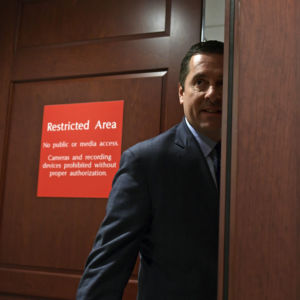The White House and its allies are embracing the tactics of the very powers with which they are accused of colluding.
Control of important narratives has always been central to politics. It has been widely observed that in the social media era, politicians and their constituents are living in increasingly divergent media worlds. Listening to remarks on the floor of Congress, it often seems that the parties are arguing not just for different answers, but about different questions. The publication of Congressman Nunes’ notorious memo alleging a partisan conspiracy at the FBI, though, represents the crossing of a new and dangerous threshold with implications far beyond the polarization of American politics.
On domestic issues, like immigration and tax reform, Republicans and Democrats can cite competing studies and cherry-picked examples to justify their positions. When politicians outright lie about the facts, they can be called out, whether by their colleagues across the aisle, or by the media, or by constituents themselves. In the world of intelligence, though, the marketplace of ideas is artificially constrained. By masking a partisan narrative as an intelligence document, Congressman Nunes has put his own narrative, one challenged by many who have seen the underlying intelligence, beyond reproach.
The House Intelligence Committee has never been free of partisan considerations, but in the past, it has fundamentally based its conclusions on the expertise of intelligence and law enforcement professionals. Last week, the conclusions of its Republican members were issued over the strident objections of those same professionals, both Republicans and Democrats, as well as the objections of every Democratic member of the committee. When Democrats attempted to provide their own analysis of the intelligence, Republicans on the committee blocked its release in the very same session in which they authorized their own. They have since voted to authorize the release of the Democrats’ memo, but this is contingent on the president’s approval, which is far from certain.
The weaponization of the intelligence oversight process is a dangerous new frontier in the United States. In many illiberal states, though, leaders frequently use the selective release of intelligence, either directly or through legislative lackeys, to shape the public’s perception of events, while using concern for national security to justify the silencing of alternative narratives. Some even use non-state actors—including hackers, organized crime, and fringe political groups—as witting or unwitting procurers and distributors of carefully curated strands of information.
Today, the most prolific of these states is Russia, and its ongoing effort to disrupt and delegitimize elections across Europe and North America is likely the most significant information warfare campaign in history. Many Americans first encountered that operation directly in summer 2016, when Russian intelligence operatives directed the selective leaking of hacked DNC emails aimed to undermine Hillary Clinton’s presidential campaign. In fact, that was the most prominent of many such covert operations aimed at German, Russian, British, and American institutions.
The release of this partisan memo, stripped of all context and underlying evidence, is a piece of that ongoing operation. In the two days after the memo’s existence was revealed, Twitter bots linked to the Russian government used the hashtag #ReleaseTheMemo 4,500 times. A bounty in exchange for a copy of the memo was offered by none other than Julian Assange, the very vehicle the Russians used to distribute the results of the DNC hack.
When Russian intelligence agents used information warfare to undermine Hillary Clinton, they may have hoped that Donald Trump might win, but they were certain that it would undermine the legitimacy of America’s institutions. With the release of this memo, they likely hope to undermine the credibility of the investigations into their prior meddling, while at the same time humiliating one of their oldest rivals, the FBI. Most Democrats and a few Republicans have recognized this. Prior to the memo’s release, Senator McCain issued a statement that observed “we are doing Putin’s job for him.”
The damage done by the memo’s release, and by the elevation of conspiracy theories to congressional investigations, cannot easily be repaired. The House Intelligence Committee has now voted to release the Democratic memo as well, but President Trump would still have to approve its release. Given his hints that he may fire Mueller or Rosenstein, in part on the basis of the Nunes memo, he may choose to quash the Democratic response entirely. If that happens, it will be another body blow to the norms of non-partisanship meant to ensure that both policymakers and voters get an unbiased view of threats to national security.

